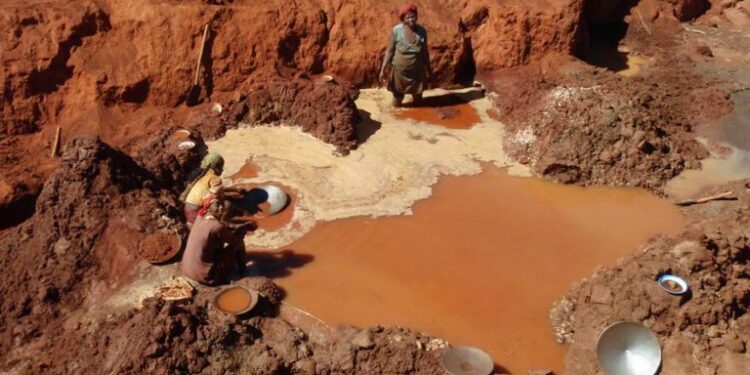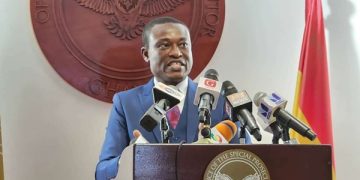Ghana’s informal mining harms health and the land – but reforms must work with people, not against them
Artisanal small-scale mining has been practised in Ghana for over a century. In 2018, small-scale miners generated 2.1 million ounces of gold, accounting for 43.1% of total gold production in the country. The sector employs 60% of Ghana’s mining workforce.
But this production has come at a cost: water pollution, land degradation, the destruction of agricultural fields, and the discharge of hazardous elements like mercury into soil and water.
Over the years, Ghana’s government has attempted to formalise artisanal mining operations. It has tried a complete ban on their operations, military interventions, dialogue, alternative livelihood programmes and community mining. But each intervention has brought a corresponding change in strategy by the miners. The net effect is that they haven’t worked.
As a research scientist, I have studied Ghana’s artisanal small-scale mining sector and the different strategies the government has used. My studies conclude that the way forward has two elements. The government needs to draw up policies that reduce the environmental and human safety risks. At the same time, it needs to take advantage of the sector’s potential to reduce poverty in rural economies.
This would go some way to making the artisanal and small-scale mining sector function for the betterment of mining communities, as large-scale mining businesses do.
A new reality
My research colleague and I conducted a study in 12 mining communities in Ghana’s western Prestea-Huni Valley district. Farming, small-scale mining and small-scale trading are the main occupations of people living in the area. We collected data between 2015 and 2022. We interviewed informal miners at their pits and collected secondary data from literature on the effects of artisanal and small-scale gold mining. We also examined laws, military interventions and information on abuses and brutalities as reported by online news sites.
Our key findings included:
- The relatively informal nature of small-scale mining makes it difficult for the government to regulate it through current laws and policies.
- Only 11 of the more than 30 evaluated laws, rules and policies that have been in place since the 1980s to regulate Ghana’s mining industry are specifically focused on ensuring the success of the informal artisanal gold mining industry.
- Since the 1980s, Ghana has used a combination of security agencies to pursue informal or unregistered miners.
- Military interventions against artisanal miners resulted in 1,502 arrests, representing 11% of 3,574 total abuses reported between 2006 and 2022.
- The most commonly reported abuses and casualties involved the seizure, confiscation and destruction of excavators by security agencies.
- The military interventions led to the deportation and arrest of foreign nationals, including Chinese, Burkinabes and Guineans.
- The number of artisanal small-scale miners continues to increase.
The way forward
We conclude from our findings that command-and-control strategies don’t work. This is because they don’t involve effectively consulting and involving affected communities. They are short-lived and unplanned. They do not address the underlying causes of the problems associated with informal mining.
The artisanal and small-scale gold mining sector in Ghana is complicated. To address the challenges associated with the sector, a comprehensive strategy incorporating the miners and local communities is required. Policies and actions that address the underlying causes (the reasons people engage in the behaviour in the first place) would be more effective.
The underlying causes of the problem could be economic, such as poverty and unemployment in mining communities. They could be social, such as marginalisation of people in mining communities and the right of the people to seek justice by digging for survival. Institutional causes include lengthy waits, onerous requirements and bureaucracies for miners to obtain new licences. The causes could also be technological, such as the use of heavy equipment, or political (involvement of political figures and “big men”).
We argue that prohibiting and criminalising informal mining won’t work.
New strategies must minimise the detrimental effects of mining while maximising the beneficial ones. These should include:
- Thorough environmental impact assessments for any undertaking or initiative that might harm the environment or the social standing of communities where mining projects take place.
- Self-regulation when it’s difficult for public policy to manage a situation. For example, small-scale miners’ associations could police their own operations.
- The education and training of communities on sustainable mining techniques to ensure that their operations are environmentally, socially and economically sustainable. This could include providing incentives, improving access to resources, and informing artisanal miners about the norms that govern their operations.
- Local government programmes to educate the public on the fundamental need for sustainable and responsible mining methods.








